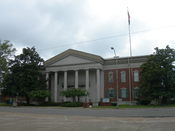Fannie was born on Octber 6, 1917 to sharecropper parents in Townsend, Mississippi. At age six she was working in the feild with her other twenty sibbings, she was the youngest of them all. She was born to poverty and racial exploitation, she receiced only a sixth-grade edcation.
She worked in the fields picking cotton. She used to work very hard because the task master would promise her with sweet candies or cherries - things that the were beyond her economic reach. By the time she was thirteen years old she was picking three to four hundred pounds.
Yet she and her family were stil poor.
In 1942 she married Perry "Pap" Hamer, a tractor driver from another plantation. They were not able to have children of thier own so they adopted two girls, one of whom died in 1967. She was living the same life of her sharecropper family, she and her husband continued the cycle of poverty.
But Hamer was a hard worker, and eventually she was promoted from the strenouse cotton-picking job to a less strenous but still low-paying job of timekeeper on the plantation.
In 1962 her life took a major turn when she met workers of the Southern Christian Leadership Conference (SCLC) and the Student Nonviolent Coordinating Committee (SNCC), who began mobilizing people to fight for freedom in Mississppi. As a result of this empowering encounter, Hamer became active in politics in Mississippi. When the call was made for volunteers to challengs the unjust voting laws, Hamer was among the volunteers. At the appointed time, August 31, eighteen persons boareded an old school bus, owned and driven by a black man from another county, to go to Indianola to the courthouse to register to vote. When she reached the courthouse she was given a literacy test that requried her to copy and interpret a portion of the Constitution of the State of Mississsippi. Having failed the test, all eighteen reboarded the bus to return to Ruleville. On the was homethey were stopped by a highway patrolman, and the driver was arrested for driving a bus that was "too yellow", looking too much like a school bus, thereby creating potential confusion. When the group refuesd to be separeted, the one-hundred- dollar fine was reduced to thirty dollars, which they as a group were able to collest among themselves.
When she returned to the plantation, she was met by the news that the plantation onwer was very upset because she had registered to vote.
He told her they she would have to go back and withdraw or would have to leave. She left the plantation. The home to which she fled was riddled with gun shots. The entire family was subsequently dissmissed from the plantation and suffered constantly from white backlash.
She returned to the courthouse in December 1962, and again failed the litercary test, she left, declaring, "You'll see me every 30 days ;till I pass." It was on her third try in January 1963 that she became a resigted voter. She also became an SNCC supervisor in Sunflower County and was actively engaged in teaching blacks to pass the literacy test.





